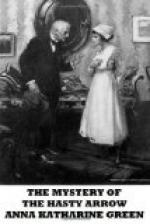Moreover, of Mr. Gryce’s secret fears there was one which loomed larger than the others and held an impulsive, unconsidered movement in check. He must have proof of her identity—which nevertheless he did not question—before hazarding himself and the success of his undertaking by a delay of so many additional hours. But what proof could he hope to obtain under the circumstances in which he found himself placed? Any appeal to Mrs. Edouard Duclos, by telephone or telegram, would certainly fail of its purpose. Even if the neat black dress in which her sister-in-law now traveled was one from her own wardrobe, he would find it impossible to establish the fact in time to make his own decision. The child—yes, he might worm that fact out of the child if he were where he could reach her; but he was miles away; and besides, something within him revolted from involving this child further in schemes honest enough from his standpoint, but certainly not helpful to her. No, he would have to trust his intuition, or—
He had thrown himself into a chair at the side of his host, but he rose quickly as his musings reached this point. The proof he had been looking for was his. In recalling the child to mind there had flashed upon his inner vision an instantaneous picture of her appearance as she stooped to pick up his stick in front of the drug-store. He saw again the bending figure, the flushed cheeks and the flaxen locks surmounted by a little hat. Ah! it was that little hat! The impression it had made upon him was greater than he thought. He found that he remembered not only its ribbons, but the bunches of curiously tinted flowers hanging down in front. And these bunches, or some precisely like them, had been the sole trimming of the hat he had been contemplating so long from the other side of the window. The woman was Madame Duclos. These flowers had been taken from the child’s hat and pinned upon the aunt’s; and it was their familiar look which had given him, without any recognition of the reason, his surety as to the latter’s identity.
Calmed immensely by this assurance, he turned back to have another word with the proprietor, now busily engaged with his newspaper.
“Will you be obliging enough to see that I’m given an opportunity for a few words with this Phil Jenkins on his return?” he asked. “And if you will be so good, respect my confidence till I am sure I have made no mistake in thinking what I have of his passenger.”
The proprietor nodded, and Mr. Gryce settled himself again inside to watch for the rowboat’s return.
What he learned that night from this man Jenkins calmed him still further. The woman had acknowledged, on leaving him, that she was going to seek work at the factory. “A little old for the job,” the man volunteered, “but spry. How she did clamber up that bank!”
It was enough; Mr. Gryce was satisfied, and engaged a seat in his small boat for the following day.




